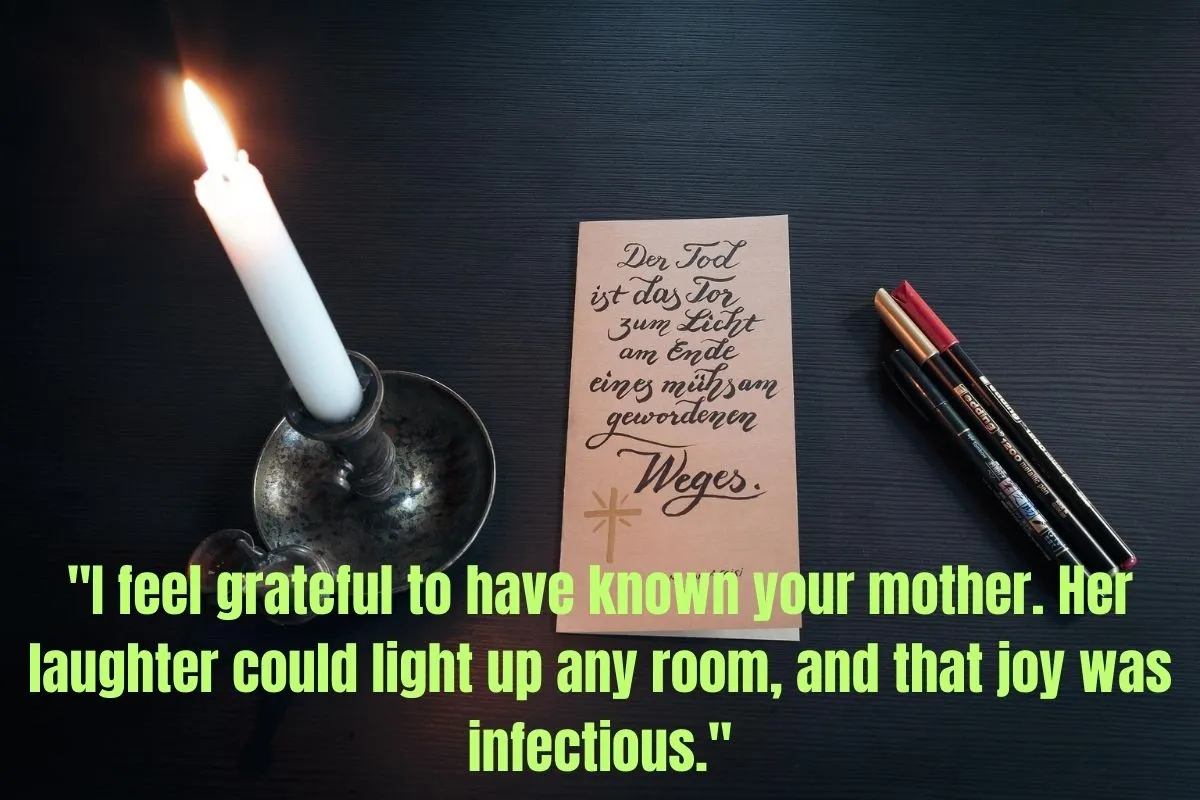It may seem difficult to say the right words when someone who is close to you loses his or her mother. Sympathy message is a comfort. Sympathy cards are retained by people and read afresh in hard times. Through your word, you can offer them long term support in the grieving stage. If you are a Brightnis Quotes lover then visit this site.
Understanding the Depth of Losing a Mother

The loss of mother has enormous impact on people. It is a relationship that influences our development since our childhood. Mothers love, guide and support us and contribute to our lives. Once that presence is gone, the sorrow is profound.
You are my friend and your job is to accept this big loss. You do not have to heal their suffering or remove. Just by appreciating the extent of their grief over the death of a loved one, you realize that you know how they feel.
Why Writing a Sympathy Card for Loss of Mother Matters
The physical sympathy cards bring about permanent comfort. Cards can be stored and re-read unlike text messages or emails. People reread their cards in hard times months later. Your considerate message turns out to be a form of constant encouragement.
The support of the community is developed with the help of personal acts of caring. You become part of the people who surround the family with love when you send a sympathy card on loss of mother. This makes them a support network that helps them to live through the bereavement.
Essential Elements of How to Write a Sympathy Card for Loss of Mother

Begin with the right tone to your message by being sincerely sympathetic. You do not have to use fancy words. Simple straightforward phrases are the best. The aim will be to recognize their suffering and demonstrate your compassion.
The fact that they understood the importance of their loss demonstrates that they were insightful. When you lose a mother, it is not like losing other things. Your condolence message should particularly give this relationship special attention. If you want to read Friend Anniversary Quotes then visit this link.
Starting with Sincere Sympathy
Simple openings work better than complicated phrases. “I’m so sorry for your loss” remains one of the most comforting ways to begin. These words acknowledge their pain without trying to fix it.
“I was deeply saddened to hear about your mother’s passing” shows respect for the relationship. This phrase recognizes that their mother was important. It validates the grief they’re experiencing.
Expressing the Significance of Their Loss
“I know how much she meant to you” validates their special relationship. This simple phrase shows you understand the mother-child bond. It tells them their grief makes sense.
“Losing a mother is unlike any other loss” acknowledges their unique grief. This statement shows you recognize the special role mothers play. It validates feelings they might not know how to express.
Short and Simple Sympathy Card Messages for Loss of Mother
Sometimes less is more. These brief sympathy messages are loaded with feeling in a small number of words. They are effective when you are expressing sympathy without throwing down a dark cloud on the reader.
“I’m so sorry for the loss of your mother. She was a wonderful woman who will be deeply missed.”
This message recognizes the loss as well as the value of the mother. It is respectful to her memory and condolence to the family.
“My heart goes out to you during this incredibly difficult time. Your mother’s kindness touched so many lives.”
This emotional message of condolences realizes the positive influence of the mother. It also justifies the sheer difficulty in this time they must have.
“Please accept my deepest condolences. I’m thinking of you and your family.”
A formal message that works in many situations. It expresses compassion while showing respect for the entire family’s grief.
“I’m deeply saddened by your mother’s passing. She raised an amazing person in you.”
This message respects the mother in terms of the role she has on her child. It demonstrates how she lives through the children through her legacy of love.
“Your mother was such a special woman. I’m so sorry for your loss.”
Simple and direct, this message focuses on the mother’s special qualities. It acknowledges grief without trying to explain or minimize it.
“Sending love and prayers to you and your family during this heartbreaking time.”
This religious sympathy message offers spiritual comfort to those who find solace in faith. It shows care for the whole family.
“I can’t imagine the pain you’re feeling. Please know I’m here for you.”
The message confirms their suffering and it is supportive. It does not attempt to put themselves in their position of sorrow but demonstrates a readiness to assist.
“Your mother’s love and spirit will live on through you. My deepest sympathies.”
This reassuring message implies that her influence is still alive. It provides hope and the present loss is recognized.
Personal Memory Sympathy Messages When You Knew Her Mother
Sharing the meaningful memories is comforting when you have personal connection. These messages are used to preserve the spirit of the mother with the particular recollections.
“I’ll never forget your mother’s warm smile and the way she made everyone feel welcome in your home. She was truly special.”
This individual memory is concerned with certain traits. It reveals the impact of her compassion on other people. The information renders it authentic and candid.
“Your mom had such a generous heart. I remember how she always asked about my family whenever we met. She will be so missed.”
This message brings out the fact that the mother is caring. It illustrates the way she changed lives by little, yet kind gestures. Such information reassures the families that their mother made a difference.
“I feel grateful to have known your mother. Her laughter could light up any room, and that joy was infectious.”
The message of the memory sharing is specific to a quality – her happy spirit. It implies that she was a gift which elevates her memory.
“Your mother always spoke of you with such pride and love. That bond between you was beautiful to witness.”
This is a message that commemorates the mother-child relationship in particular. It informs them that people realized and liked their relationship. This has the power to console in times of grieving.
“I’ll always remember your mother’s incredible strength and grace. She faced every challenge with such dignity.”
This message honors the mother’s character. It suggests she was admired for her strength. This can help families feel proud of their mother’s legacy.
“Your mom had the most generous spirit. She never hesitated to help others, and that kindness made a difference in so many lives.”
This is a good praise of the generous nature of the mother. It demonstrates how she leaves a legacy of love in the way she acts towards people.
Sympathy Card Messages When You Didn’t Know Her Mother Personally
To provide comfort without any personal relationship, it is necessary to pay attention to the mother-child relationships. These messages succeed when you like a person and you have not known the mother to that person.
“I never had the opportunity to meet your mother, but I know she must have been an incredible woman to have raised someone as caring as you.”
This message exalts the mother via the child. It says that it is her influence that made the person you know so wonderful. This perspective-taking sentence justifies the value of the mother and the sorrow of the child.
“While I didn’t know your mother personally, I can see her love and influence in the wonderful person you are.”
As in the case of the earlier message, this is concentrated on tangible outcomes of good mothering. It infers that the love of the mother is extended through her child.
“I may not have known your mother, but I know how much she meant to you, and my heart aches for your loss.”
This is a sympathetic communication that recognizes the relevance of the relationship. It authenticate their sorrow even without having intimate familiarity with the mother.
“Though I never met your mother, I’ve heard you speak of her with such love and respect. She clearly meant the world to you.”
This message uses the conversations you have. It makes you hear them when they spoke about their mother. This confirms emotions and expresses concern.
“I can see your mother’s love reflected in the person you’ve become. Even though I never knew her, I can tell she was wonderful.”
This communication implies the impact of the mother to be reflected in her child. It praises her without obnoxiously professing to know her.
Faith-Based Sympathy Messages for Loss of Mother
To the individuals who seek solace in spiritual care, these messages have faith-based hope and healing. Apply these in the cases where you are sure the family shares those beliefs.
“Praying for God’s comfort to surround you during this difficult time. Your mother is now at peace.”
This religious support message gives both prayers and the assurance of the mother lying in peace. It offers hope to the pain at hand.
“May you find strength in your faith and comfort in knowing your mother is in God’s loving arms.”
This is a message that is both spiritual and comforting with the promise of Godly care. It implies that the mother is secure and appreciated in the post-mortem.
“I’m praying for you and your family. May God’s love bring you peace in the days ahead.”
This religious sympathy message offers ongoing prayers and hope for future peace. It acknowledges that healing takes time.
“May the Lord comfort you during this time of loss. Your mother’s beautiful soul is now at rest.”
This message is a mixture of a prayer and the picture of the resting mother. It presents present solace and it promises the hope that is everlasting.
“I’m lifting you up in prayer. May God’s peace that passes understanding fill your heart.”
This message references biblical comfort while offering specific prayers. It suggests divine
What to Avoid When Writing a Sympathy Card for Loss of Mother

Mistakes are common and they can be harmful rather than helpful in the grieving of an individual. Knowing what to avoid saying is important to safeguard their emotions and makes your message more productive. If you want to read Short Christmas Card Messages for Family and Friends then visit this link.
Common Phrases That Can Cause Hurt
“She’s in a better place” might make people feel guilty for wanting their mother back. This phrase can suggest they should be happy about the death. Even if meant to comfort, it can minimize their loss of a loved one.
“Everything happens for a reason” tries to make sense of senseless loss. Most people don’t want to hear that their mother’s death served some purpose. This phrase can feel dismissive of their pain.
“I know how you feel” assumes all grief is the same. Each relationship is unique. Each loss affects people differently. This phrase can make people feel like their specific pain isn’t understood.
“At least she’s not suffering anymore” focuses on positives during deep pain. While this might be true, it’s not what grieving people need to hear immediately. Let them feel sad without looking for silver linings.
“You need to be strong” puts pressure on grieving people. It suggests their natural emotions aren’t okay. Grief is normal and healthy. People need permission to feel sad, not pressure to appear strong.
Timing and Approach Mistakes to Avoid
Getting yourself to be at the center of attention makes their loss a back burner. Do not tell them any long stories of personal grief. Remember that they have a mother and are hurting.
It is presumptive to give unsolicited advice on how to cope with loss. Human beings should be able to mourn at their time and manner. Allow them to be a driving force in what benefits them.
The minimization of losses in comparison reduces their pain individually. It is tempting to say I lost my mother too, however, no two relationships are the same. May it be their sorrow concerning their definite loss.
Having expectations of the way they grieve puts them under pressure. Never say stuff such as you should feel better soon or she would not want you to be sad. Allow them to mourn in their own way.
Hurrying obtures the fact of loss. The process of healing is a time-consuming process, and it usually goes on longer than folks want to believe. Don’t give schedules of when they will feel better.
Special Considerations When Writing Sympathy Cards for Loss of Mother

You need to make intelligent modulations to your message depending on the circumstances. When writing your sympathy card, put into consideration the age, death circumstances and the family dynamics of that person.
“Your mother lived such a full, beautiful life. The love and memories you shared over all those years are treasures that will comfort you forever.”
“I’m so sorry your mother was taken from you far too soon. The depth of love you shared was clear to everyone who knew you both.”
Adult children with young kids face the additional pain of their children losing a grandmother. Acknowledge this generational impact in your message.
“I’m so sorry for the loss of your mother and your children’s beloved grandmother. Her love touched multiple generations.”
Circumstances of Loss
“I know this has been such a difficult journey for all of you. Your mother was blessed to have such loving care during her illness.”
Sudden loss creates shock alongside grief. People may struggle to believe what happened. Your message should acknowledge this trauma.
“I’m so shocked and saddened by the sudden loss of your beloved mother. This must feel so unreal and overwhelming.”
Anticipated vs. unanticipated death evokes emotional dissimilar requirements. Anticipated death gives a chance to prepare yet it causes immense depression. Premature death contributes to the loss.
The Practical Side of Sending Sympathy Cards for Loss of Mother

Timing Your Sympathy Card
Immediate aftermath refers to the initial 2 weeks following death. It is at this time that the families get the highest cards and encouragement. Your message helps other people to surround them with love in the darkest hour.
“I just learned about your mother’s passing, and I wanted to reach out even though time has passed. My thoughts are with you.”
Choosing the Right Card
Simple or elaborate will be based on the relationship and style of a family. Simple cards with considerate phrases usually help better than fancy design that may make you forget what you are saying.
Religious or secular must be corresponding to the family beliefs where possible. You do not know, then you should pick neutral cards as they are about love and memories and not about certain religious image.
Delivery Considerations
Ecosystems There are advantages to mailing and hand delivery. Mailed cards can come at a time when the family is willing to read these. Hand delivery is very supportive, but may encroach on personal mourning.
“I’d like to bring dinner Tuesday evening. What time works best, and are there any foods to avoid?”
Long-term Support
It is important to remember key dates as a sign of continued care. Put her birthday, her death anniversary and Mother’s Day on your calendar. Send them cards or call on such hard days.
“Thinking of you today on your mother’s birthday. I know this day must be especially hard.”
Conclusion
How to write a sympathy card on loss of mother can be reduced to one simple fact that sincerity is more important than the magic words. The fact that you cared to do this indicates that you are aware of their great loss and you want to console.
In sending a sympathy card to loss of mother, you’re giving a love gift in the most challenging times of life. Their healing process will involve your words, which will act as a comforting factor that they can revisit any time they feel like reminding them that they are not alone in their sorrow. If you want to offer sympathy to anyone then must visit Condolence Text Messages to Offer Sympathy.

Welcome to Brightnis! I am the admin and creator of this platform. I love questioning ideas and exploring different situations. My goal is to encourage critical thinking and help people see things from new perspectives. Join me in discussing thought-provoking topics and finding unique solutions to everyday challenges!
















